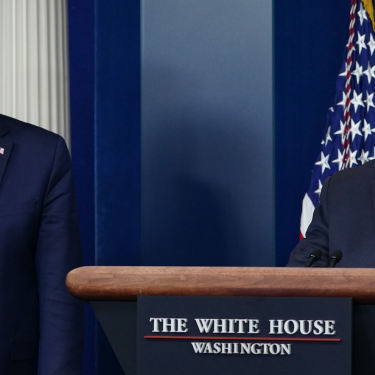US – RSF calls on Trump administration to allow free flow of information on coronavirus

Reporters Without Borders (RSF) is alarmed by the chilling trend of press access denials and retaliatory measures against journalists, government employees and whistleblowers attempting to report on and speak out about the COVID-19 crisis in the United States. It is a matter of urgent public health that journalists freely report on this pandemic and those with information related to the pandemic speak out without fear of retribution.
Journalists covering the COVID-19 pandemic in the United States and their journalistic sources have faced access denials and retaliation for their reporting on the virus. Reporters from The New York Times and ProPublica were charged on April 9 with criminal trespassing at Liberty University related to their reporting on the university's decision to partially re-open its campus at a time when most other universities were closing indefinitely in an effort to combat the spread of coronavirus. Medical professionals at health centers around the country have been restricted from speaking freely to the press about their working conditions, with one being fired after speaking to the Seattle Times about his complaints with the hospital and another reprimanded after speaking to the British publication Metro about being scared to go to work.
Earlier this month, Acting Navy Secretary Thomas Modly fired Brett Crozier, captain of the U.S. navy aircraft carrier Theodore Roosevelt, for raising the alarm about an outbreak of coronavirus on his ship. That outbreak has infected nearly 600 sailors, including Captain Crozier, and killed one.
In February, the Trump administration directed Vice President Mike Pence to control all government health and science experts’ interactions with the press. In early-April, Vice President Pence briefly prohibited members of the White House’s coronavirus task force from appearing on CNN. The vice president for a time barred task force member Dr. Anthony Fauci from directly speaking to the public at all without approval. On April 2, the Knight First Amendment Institute sued the Centers for Disease Control (CDC) for the release of information regarding the policy that permits the administration to restrict CDC employees from speaking publicly or to the press. While it appears some restrictions may have been relaxed in recent days, the administration’s policy on allowing these experts to speak to the press is still not publicly available.
“The Trump administration has repeatedly criticized the Chinese government for its response to the virus, but the administration is taking a page out of China’s playbook by muzzling health experts, punishing whistleblowers and targeting journalists for their critical coverage,” said Dokhi Fassihian, Executive Director of RSF USA. “For the Trump administration to have any ground to stand on in its handling of this crisis, it must first foster an environment that allows for the free flow of information and the ability of government employees to speak out.”
Journalists across the nation have also encountered access denials in the course of their reporting. In Missouri, Governor Mike Parson has barred reporters from attending his daily press briefings and tasked his staff with selecting reporters’ questions, which they must submit by e-mail an hour prior. On March 28th, a Florida journalist was denied entry to Governor Ron DeSantis’ COVID-19 briefing after asking for “social distancing” at previous briefings.
Meanwhile, the White House continues to verbally attack reporters during the daily coronavirus press briefings. During an April 19 briefing, President Trump attacked CBS reporter Weijia Jiang, telling her to "lower her voice" and take it "nice and easy” when she asked why the administration had not done more to prepare for the virus.
The United States is ranked 45th out of 180 countries in RSF's 2020 World Press Freedom Index.



